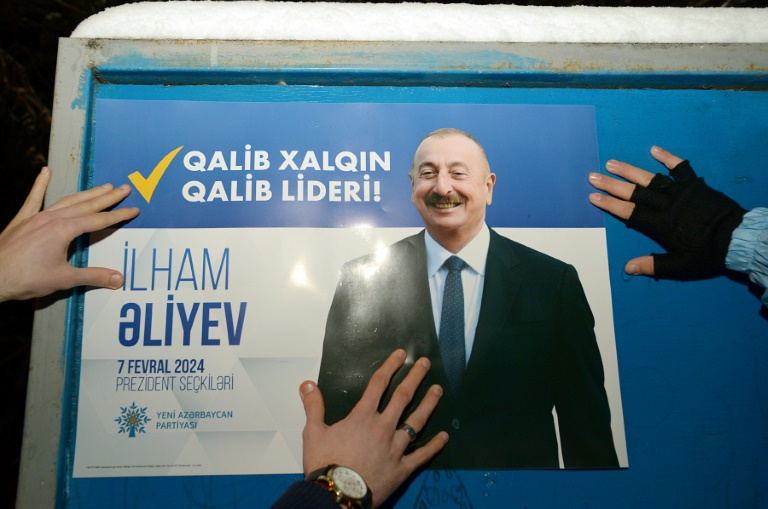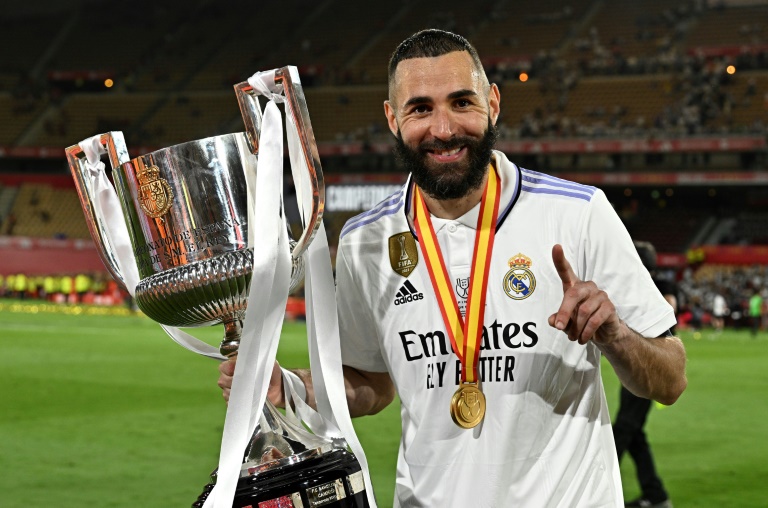Azerbaijani strongman Ilham Aliyev, who will likely sail to a fifth presidential term in Wednesday’s election, is cementing his hardline rule after securing a historic victory over Armenian separatists.
Aliyev called the elections one year ahead of schedule in December, as he was riding high in polls for securing victory over Armenian rebels in a three-decade territorial dispute.
Aliyev was celebrated as a national hero after his troops recaptured the mountainous Nagorno-Karabakh region in September’s one-day offensive.
The conflict ended one of the most bitter standoffs of the post-Soviet era and reclaiming territory that had sparked wars in 2020 and in the 1990s and claimed tens of thousands of lives on both sides.
Tens of thousands of ethnic-Armenian refugees fled the territory after Azerbaijani troops took over.
The victory “saw Aliyev’s approval ratings soar and guaranteed his electoral win in the upcoming election,” said political analyst Farhad Mammadov.
“Polls have shown that the occupation of 20 percent of Azerbaijani lands was the number one issue for Azerbaijanis,” he added.
The 62-year-old took over in 2003 after the death of his father Heydar Aliyev, a former Soviet KGB officer and Communist-era boss.
He then extended his family’s grip over the oil-rich Caspian state in elections in 2008, 2013, and 2018 that were denounced by the embattled opposition as fraudulent.
Supporters have praised the Aliyevs for turning the republic — once thought of as a Soviet backwater — into a flourishing energy supplier to Europe.
But critics argue they have crushed the opposition and used their power to amass a fortune that funds a lavish lifestyle for the president and his family.
Opposition parties have said they will boycott the elections, accusing Aliyev of orchestrating systematic political repression.
“There are no conditions in the country for the conduct of free and fair elections,” said Ali Kerimli, the leader of the opposition National Front party.
“Political dissent is being harshly suppressed. We are not going to be part of falsified elections and the imitation of democracy.”
Aliyev’s government has recently escalated a media crackdown, arresting several journalists who have exposed corruption among the political elite.
He amended the constitution in 2009 so he could run for unlimited presidential terms and in 2016 extended term limits from five to seven years.
The changes drew criticism from Council of Europe constitutional law experts as “severely upsetting the balance of powers” and giving the president “unprecedented” authority.
Then in 2017, the president appointed his glamorous wife Mehriban Aliyeva as first vice president.
Born into the powerful Pashayev family, Mehriban is sometimes seen as a possible successor or even rival to her husband.
The next generation of the Aliyev dynasty seems set to continue the family’s leading political role.
US media has reported on property worth $75 million (68 million euros) in Dubai in the names of the president’s three children, son Heydar, and daughters Arzu and Leyla.
They are often spotted at lavish red-carpet events abroad and are thought to control substantial business interests of their own.
Bolstered by billions in oil money, Ilham has overseen years of economic growth and forged a strong military alliance with Turkey, while treading carefully between Russia and the West.
That approach saw him likened in one US diplomatic cable to the coldblooded fictional character of Michael Corleone from “The Godfather” movies.
Aliyev’s heavy-handed treatment of dissent at home also inspired comparisons to another character from the Corleone clan — Michael’s hot-headed brother Sonny.
“His goal appears to be a political environment in which the Aliyev dynasty is unchallenged,” said the cable, released by whistleblowing organisation WikiLeaks.






